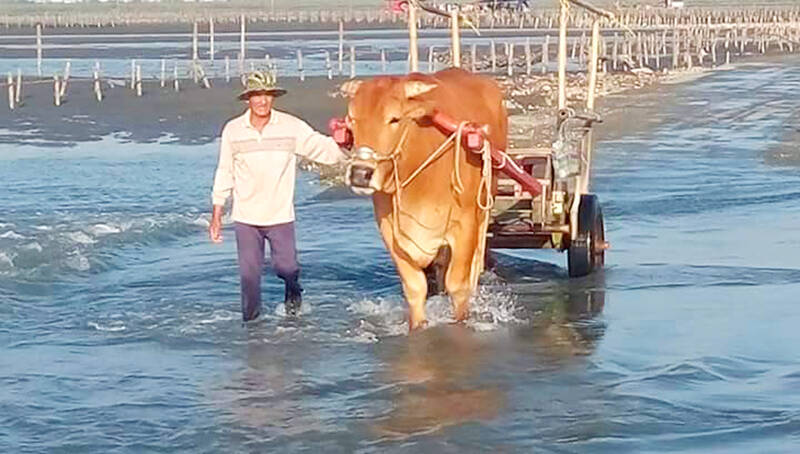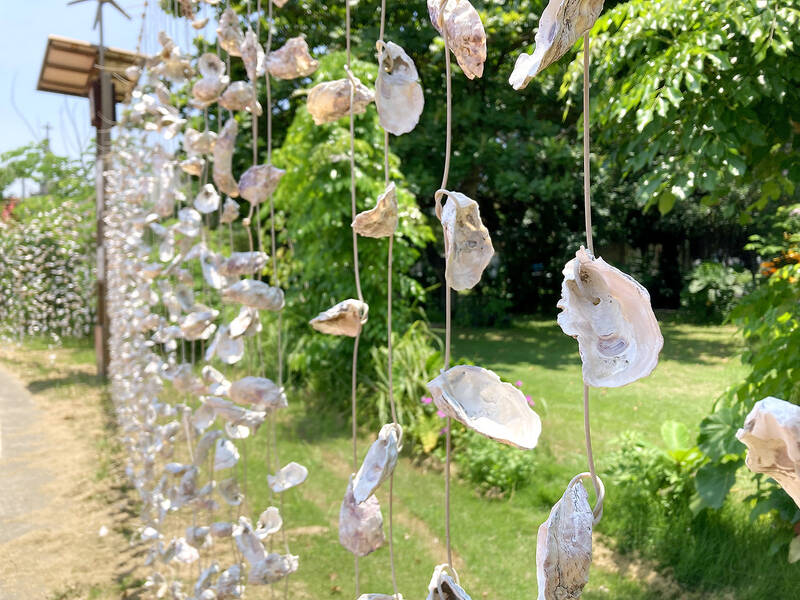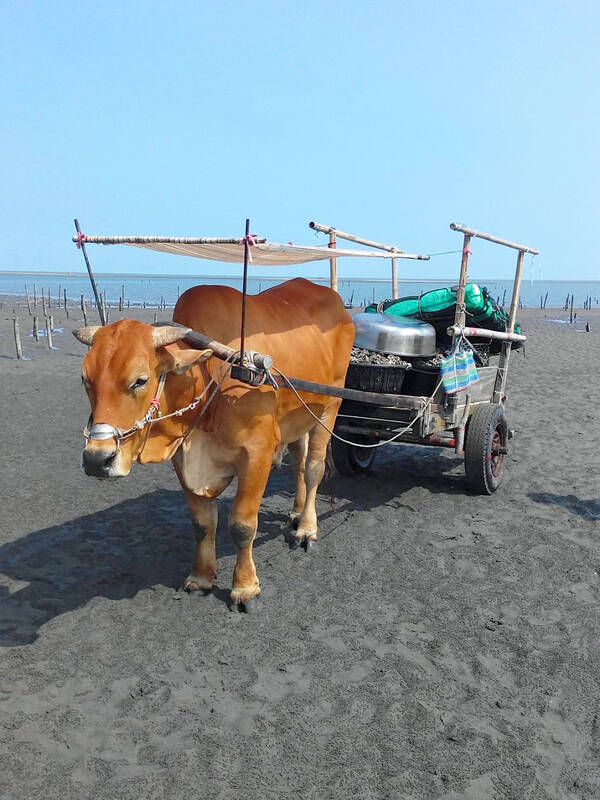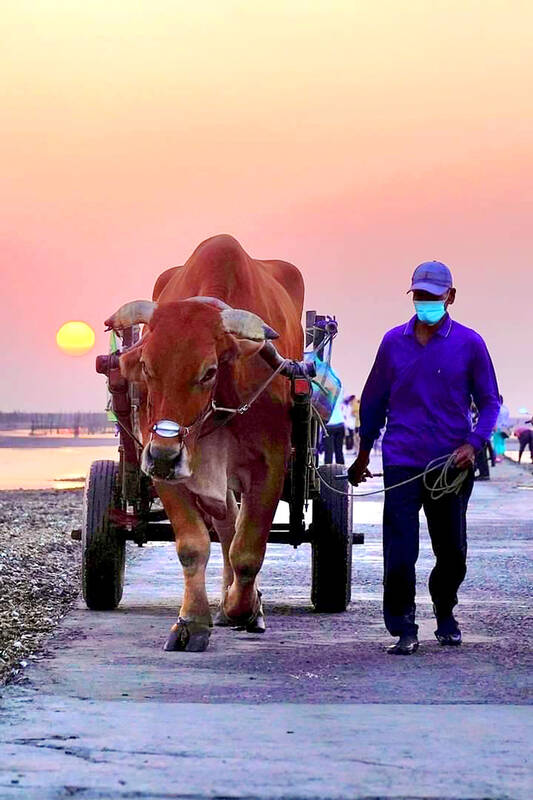In Changhua County’s coastal village of Fangyuan (芳苑), “ocean oxen” (海牛) are trained to help harvest oysters, which is the dominant economy of the village. However, in recent years their numbers have decreased significantly.
“Fangyuan would not be Fangyuan without ocean oxen,” says Hung Wu-hsiung (洪武雄), an elderly ocean oxen trainer.
Although their numbers are diminishing, locals are working hard to preserve their culture, which dates back to the Qing Dynasty, when Fangyuan was a bustling port town.

Photo courtesy of Hong Yan-chao
“Back in Fangyuan’s heyday, we were Lukang’s second port, and we had over 400 ocean oxen,” says Wu Wei-cheng (吳偉誠), principal of Fangyuan Elementary School (芳苑國民小學).
But today, Fangyuan’s population has shrunk dramatically, and there are only eight of the bovines left.
Ocean oxen are not a specific breed. They are trained to walk into the ocean, wait as oyster farmers load up their haul and then bring the cart back home. The large lumbering creatures learn the route from their home to the oyster field, so harvesters do not need to direct their oxen where to go.

Photo: Charles DeBenedetto, Taipei Times
Training an ocean ox can take years.
“Some are well-behaved and easy to train,” Hung says, “while others are troublemakers.”
A DIMINISHING CULTURE

Photo courtesy of Hong Yan-chao
Although some elderly residents still use ocean oxen, most of the harvesters today use machines because they are more efficient.
“It takes about four hours to harvest oysters with an ocean ox,” Hung says. “But machines can work twice as fast. Also, they don’t need rest.”
But some local residents, like Wei Ching-shuei (魏清水), leader of the Fangyuan Ocean Oxen Culture Association (芳苑海牛文化協會), are working hard to keep the culture alive.

Photo courtesy of Chen Hong-yun
His association conducts ocean oxen tours, where guests can ride in an ox-cart and collect oysters and clams to grill. Several other ocean oxen owners also conduct similar tours.
Wei says he’s trying to get the Fangyuan ocean oxen to be approved as a UNESCO World Heritage — an effort that the community hopes will bring new interest in this culture to Fangyuan’s youth, so they will carry on the tradition.
UNCERTAIN FUTURE
But success is far from certain.
Despite the modest growth of the ocean oxen tours, it is unclear if this tradition will survive.
“If people come, then our culture will not disappear,” says Huang Kuan-chang (黃冠彰), director of general affairs at Fangyuan Elementary School.
“Fangyuan cannot lose our ocean oxen,” Hung says.
In 2018, the school published a student-created picture book called Ocean Oxen’s Home (海牛的家鄉), which contains stories about all of the current ocean oxen owners.
“In the end, our ocean oxen will almost certainly disappear. But the most important thing is to remember that they were here,” Wu says.
TOUR INFORMATION
For information about ocean oxen tours visit the Changhua County Tourism Bureau’s English-language Web site: shorturl.at/ioBC1
Tours are conducted in Mandarin, are family friendly and will only depart at low tide. Because low-tide occurs at different times throughout the year, it is recommended to call in advance to confirm the departure time. Tours usually last about 2-3 hours. Although some tour guides speak English, it is recommended that at least one person in your party speak Mandarin in order to translate if necessary.
Hung Yan-chao also offers tours. Tel: (0953) 911-378.
Participants are encouraged to bring water, sunglasses and UV-protection clothing.

March 10 to March 16 Although it failed to become popular, March of the Black Cats (烏貓進行曲) was the first Taiwanese record to have “pop song” printed on the label. Released in March 1929 under Eagle Records, a subsidiary of the Japanese-owned Columbia Records, the Hoklo (commonly known as Taiwanese) lyrics followed the traditional seven characters per verse of Taiwanese opera, but the instrumentation was Western, performed by Eagle’s in-house orchestra. The singer was entertainer Chiu-chan (秋蟾). In fact, a cover of a Xiamen folk song by Chiu-chan released around the same time, Plum Widow Missing Her Husband (雪梅思君), enjoyed more

Last week Elbridge Colby, US President Donald Trump’s nominee for under secretary of defense for policy, a key advisory position, said in his Senate confirmation hearing that Taiwan defense spending should be 10 percent of GDP “at least something in that ballpark, really focused on their defense.” He added: “So we need to properly incentivize them.” Much commentary focused on the 10 percent figure, and rightly so. Colby is not wrong in one respect — Taiwan does need to spend more. But the steady escalation in the proportion of GDP from 3 percent to 5 percent to 10 percent that advocates

From insomniacs to party-goers, doting couples, tired paramedics and Johannesburg’s golden youth, The Pantry, a petrol station doubling as a gourmet deli, has become unmissable on the nightlife scene of South Africa’s biggest city. Open 24 hours a day, the establishment which opened three years ago is a haven for revelers looking for a midnight snack to sober up after the bars and nightclubs close at 2am or 5am. “Believe me, we see it all here,” sighs a cashier. Before the curtains open on Johannesburg’s infamous party scene, the evening gets off to a gentle start. On a Friday at around 6pm,

A series of dramatic news items dropped last month that shed light on Chinese Communist Party (CCP) attitudes towards three candidates for last year’s presidential election: Taiwan People’s Party (TPP) founder Ko Wen-je (柯文哲), Terry Gou (郭台銘), founder of Hon Hai Precision Industry Co (鴻海精密), also known as Foxconn Technology Group (富士康科技集團), and New Taipei City Mayor Hou You-yi (侯友宜) of the Chinese Nationalist Party (KMT). It also revealed deep blue support for Ko and Gou from inside the KMT, how they interacted with the CCP and alleged election interference involving NT$100 million (US$3.05 million) or more raised by the